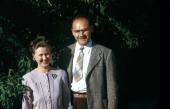
Woodrow Lloyd was born in Webb on July 16, 1913. He was the youngest of twelve children born to Welsh settlers. He enrolled at the School of Engineering, University of Saskatchewan in 1929. Due to the Depression, he was unable to return after the first year. In 1931, after a year spent working on the family farm, he trained as a teacher, hoping to finance his eventual return to university by teaching.
A fundamental part of Lloyd's education came from his family's passionate interest in politics. When the Saskatchewan Teachers' Federation (STF) was formed in 1933, Lloyd became involved and the following year became a councillor. At a local STF meeting he met Victoria Leinan. They married in 1936 and had two daughters and two sons. They settled in Vanguard where Lloyd became principal of the four-room school. He continued his studies and in 1940 was awarded a BA; the following year he received his Permanent Certificate for high school teaching. He enrolled in the RCAF during the war, but poor eyesight meant he was restricted to the drilling of cadets.
Elected to the presidency of the STF in 1940, he held the position for four years. In 1941, he became vice-principal of the high school in Biggar. He made contact with the local CCF and joined T.C. Douglas' task force on the future of provincial education. Lloyd was elected in 1944. His appointment as Minister of Education made him Canada's youngest Cabinet Minister to date. As the MLA for Biggar, he won the six subsequent elections, until he stepped down in 1971.
Lloyd established the controversial Larger School Units that brought changes to rural communities and a new system of taxation for education. A scheme of loans and bursaries to students, the first of its kind in Canada, also became a vital part of his program, and was soon copied by other provincial governments. Lloyd was a member of Treasury Board and, in 1954, represented the province at the Commonwealth Parliamentary Association Convention in Africa.
Following the 1960 election, Lloyd became provincial Treasurer and, in his first and only budget, demonstrated his belief that tax dollars were good dollars. In 1961 Tommy Douglas was elected national leader of the NDP and Lloyd became leader of the provincial CCF, and Premier. Medicare was introduced in 1962 followed by a doctors' strike that started on July 1. The government imported doctors to staff hastily established Community Clinics. An agreement was finally reached on July 23. In the 1964 provincial election, after twenty years in power, the CCF lost to the Liberals. As leader of the Opposition, Lloyd began to rebuild the party and reassess party philosophy but lost again in 1967. Lloyd supported the “Waffle Manifesto” that concerned itself with the ownership of Canadian resources. Discontented party members attacked his leadership and he resigned in 1970 but continued as an MLA until an election was called the following year.
He became resident representative for the United Nations Development Program in South Korea but died within two months on April 7, 1972.
Dianne Lloyd Norton